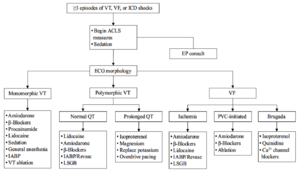Electrical storm: Difference between revisions
| Line 1: | Line 1: | ||
==Background== | ==Background== | ||
*Definition | *Definition | ||
**3 or more episodes of sustained VT, VF, or ICD shocks within 24 hours | **3 or more episodes of sustained [[VT]], [[VF]], or ICD shocks within 24 hours | ||
*Risk factors <ref> Brigadeau F et al. Clinical predictors and prognostic significance of electrical storm in patients with implantable cardioverter defibrillators. Eur Heart J 2006;27:700-7. </ref> | *Risk factors <ref> Brigadeau F et al. Clinical predictors and prognostic significance of electrical storm in patients with implantable cardioverter defibrillators. Eur Heart J 2006;27:700-7. </ref> | ||
**CAD | **CAD | ||
**HFrEF | **HFrEF | ||
**Long QT | **[[Long QT]] | ||
**DM2 is protective | **DM2 is protective | ||
*Causes | *Causes | ||
**Ischemia | **Ischemia | ||
**Electrolyte derangement | **Electrolyte derangement | ||
**Iatrogenic ( | **Iatrogenic (i.e. [[QT prolonging medications]]) | ||
**[[Hyperthyroidism]] | **[[Hyperthyroidism]] | ||
**Infection/Fever | **Infection/[[Fever]] | ||
==Clinical Features== | ==Clinical Features== | ||
Revision as of 02:09, 2 June 2015
Background
- Definition
- Risk factors [1]
- CAD
- HFrEF
- Long QT
- DM2 is protective
- Causes
- Ischemia
- Electrolyte derangement
- Iatrogenic (i.e. QT prolonging medications)
- Hyperthyroidism
- Infection/Fever
Clinical Features
- Presentation as:
- Cardiac arrest
- Palpitations
- (Pre)Syncope
- ICD patient complaining of shock(s)
Differential Diagnosis
- Tachycardia (wide)
- ICD malfunction
- AF/SVT
- Oversensing
- Lead fracture
Diagnosis
Management

Proposed treatment algorithm for electrical storm[2]
Disposition
- CCU or cath lab


